Mike Cobb: The Hardest Working Man in Central America, Creating Communities that Evoke Familiar Melodies
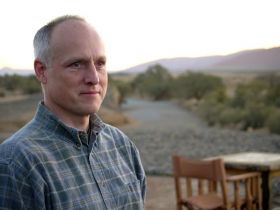 These places would seem to the native inhabitants to be neglected lands of unruly bushes and trees with views that were pretty, but where one did not linger while on one’s way to somewhere else. But to Mike Cobb, these were places to turn into communities with a network of pathways close to the cool porches of neighbors one would regularly visit.
These places would seem to the native inhabitants to be neglected lands of unruly bushes and trees with views that were pretty, but where one did not linger while on one’s way to somewhere else. But to Mike Cobb, these were places to turn into communities with a network of pathways close to the cool porches of neighbors one would regularly visit. In this interview, Jet Metier learns that though not a builder by training or a developer by plan, Mike Cobb has an internal vision that leads from the heart; a recognition for the needs of others for neighborhoods that evoke peace, warmth and nostalgia in places exotic and secluded. And when you step into Mike’s communities, what comes to you are familiar songs that make you happy, and you understand that only by dint of hard work are such dreams achieved by someone like Mike Cobb.
[Mike Cobb, CEO and Co-Founder of ECI Development, pictured.]
Jet Metier: Hi Mike. I am so glad that you’re able to fit me in before you fly to Cancun for an offshore conference and then travel back to Belize. What a whirlwind schedule you have!
Mike Cobb: And after that, I’m going to pick up a group of people here who are on an 8-day two-country tour of Belize and Nicaragua.
Jet Metier: Do you have a standard method you use to help people figure out which country or area would be best for them?
[Grand Baymen Gardens condos, Ambergris Caye, Belize, pictured.]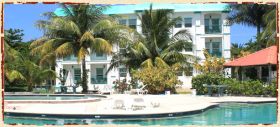

Mike Cobb: People sometimes ask me, “What’s the difference between living in Grand Bayman in Ambergris Caye, Belize, and living in your Gran Pacifica project in Nicaragua?”
Or, “Which community should I live in?”
“Which do I like better?”
I tell them, “Ambergris Caye is a lot like Jimmy Buffet music, and Gran Pacifica is a lot like country music.”
[House with porch and balcony offered by ECI in Gran Pacifica, Nicaragua, pictured.]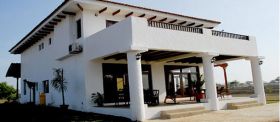

So, if they like Jimmy Buffet music, or if they like the genre or they can relate to that, then they’ll probably like Ambergris Caye. Or if they’re a country music person…
Jet Metier: We’re talking about pickups and dogs in the pickups?
Mike Cobb: We’re talking people on horses driving cows down the middle of the road.
Jet Metier: What music or culture would you apply to your resort/ community in Panama?
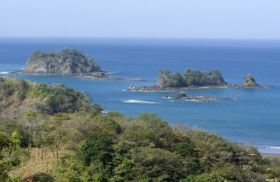
[ECI's property in the western region of the Azuero Peninsula, pictured.]
Mike Cobb: it’s similar to Nicaragua. It’s definitely more of a cowboy and ranching culture.
Jet Metier: Is there a good surf spot there? Is there a good surf break? Body boarding? Scuba?
Mike Cobb: Yes. Nearby.
Jet Metier: So it’s ideal for surfing cowboys!.jpg)
.jpg)
[Oceanfront development for ECI in Limon, Costa Rica, pictured.]
Mike Cobb: Yes, Jet. I never thought of it that way, but it does make sense… and it’s a pretty good visual, as well.
Jet Metier: Let’s go with a fun question. Last year, how many air miles, do you think you logged?
Mike Cobb: I can get pretty close on that. I flew 120,000 miles on United and probably another 30,000 on other airlines.
Jet Metier: So what countries do you routinely travel to?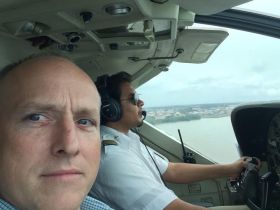
Mike Cobb: I travel to Belize every month; Panama, four to five times a year; Costa Rica, four to five times a year. I just got back from Argentina and Chile.
Jet Metier: What were you doing there?
Mike Cobb: I can get pretty close on that. I flew 120,000 miles on United and probably another 30,000 on other airlines.
Jet Metier: So what countries do you routinely travel to?

Mike Cobb: I travel to Belize every month; Panama, four to five times a year; Costa Rica, four to five times a year. I just got back from Argentina and Chile.
Jet Metier: What were you doing there?
[Mike Cobb in Tropic Air as "co-pilot," pictured.]
Mike Cobb: I did a couple of things. One of them was I was looking for property for ECI for the vineyard community.
Jet Metier: Excuse me, did you say vineyard? Are you branching into growing wine?
Mike Cobb: We will not grow wine. We will subcontract some people who know what they are doing, but we will build a village and a neighborhood with a vineyard in and around the village.
Jet Metier: That sounds so appealing and so beautiful.
Mike Cobb: Thank you.
Jet Metier: How did that come about? What influenced you?
Mike Cobb: I can give you the easy answer. ECI’s business model is to build communities in unique geographies. We’ve got a “Key West or approaching Caicos kind of Caribbean island Caribbean vibe” in Ambergris Caye, Belize with Grand Baymen. We’ve got a “South Florida and Caribbean” feel in South Costa Rica with our upcoming project, Grand Caribbean. We’ve got the California feel in Nicaragua, with cactus and palm trees at Gran Pacifica in an arid climate. But then in Panama, it’s a hillier project. We own a piece of a community there called Los Islotes.
Those are the four properties we own as of now. Each of these properties has a very, very different and unique feel about it. The other unique geography in this part of the world is the highlands, which is where they grow coffee. We’re looking at the central valley of Costa Rica or maybe near Cuenca, Ecuador. I’m leaning towards Ecuador at the moment. We’ll see how it goes.
Jet Metier: I hear that Ecuador is becoming a hot expat location..png)
Those are the four properties we own as of now. Each of these properties has a very, very different and unique feel about it. The other unique geography in this part of the world is the highlands, which is where they grow coffee. We’re looking at the central valley of Costa Rica or maybe near Cuenca, Ecuador. I’m leaning towards Ecuador at the moment. We’ll see how it goes.
Jet Metier: I hear that Ecuador is becoming a hot expat location.
.png)
Mike Cobb: Ecuador’s hot because it’s very, very, very inexpensive. It is the least expensive location for cost of living purposes in South America, even Central America, except possibly for Bolivia.
Jet Metier: Mike, with the possible exception of one person, I declare you “The Hardest Working Man in Central America.”
[Working a conference booth with daughter, Amanda for "Go to Work with Dad" week, pictured.]
Mike Cobb: Why, thank you.
Jet Metier: You create worlds within worlds. With your vision and your hard work, you make these very special developments happen. So what was it when you were a young guy? What was it about how your parents raised you? Or were there any other influences?
Jet Metier: You create worlds within worlds. With your vision and your hard work, you make these very special developments happen. So what was it when you were a young guy? What was it about how your parents raised you? Or were there any other influences?
Mike Cobb: That’s a deep, heavy question. My dad always worked really hard. I saw him work hard all his life. He was a college professor, but we had a piece of property, about ten acres, at the edge of town. We had a huge garden; we had ponies, geese, and ducks. We had a couple of ponds, dogs and cats. And there were always fences to build or garden work to do or trees to plant. This was in Western Pennsylvania, a small little town. There were woods behind my house that went on forever; cornfields, dirt roads. It was country.
Jet Metier: Sounds beautiful..jpg)
Jet Metier: Sounds beautiful.
.jpg)
Mike Cobb: My dad grew up in a dairy farm and he understood 365 days of work. But he always impressed on me the importance of hard work combined with smart work and set examples himself. My mother was an elementary school teacher. There wasn’t a lot of idle time, so to speak.
[Cobb family on active volcano and cinder cone Cerro Negro in Nicaragua, pictured.]
We did things as a family. We traveled a lot. My dad had several teaching opportunities in Europe during the summer, so by the time I graduated high school, I spent four or five summers in Salzburg, Austria. My father was teaching political science and public administration and my sister, my mom and I would travel around and have fun.
Jet Metier: You’re living in rural Pennsylvania but your summers were in another country. Did it influence you then or later as to what you wanted to do?
Mike Cobb: It definitely influenced me then. It broadened my horizons to be somewhere else and just to see that it’s different, as you look at your own culture from a new perspective, from a different perspective.
Jet Metier: What perspective, at that age, did you see in the contrast of Austrian culture with the culture in Western Pennsylvania? Were you a kid or a teenager when this happened? What kind of differences did you notice?.jpg)
Jet Metier: What perspective, at that age, did you see in the contrast of Austrian culture with the culture in Western Pennsylvania? Were you a kid or a teenager when this happened? What kind of differences did you notice?
.jpg)
[Sand sledding with Cobb family on slopes of Nicaraguan volcano, pictured.]
Mike Cobb: I think I was in Austria maybe three times when I was in elementary school and twice more between middle school and graduation.
I’ll tell you a story. I remember a high school classmate who I had grown up with all the way from elementary school. Probably when we were in 10th grade or so, he said something like, “Hey, what did you do this summer?”
I said I spent the summer in Europe.
He said to me, “You know, Mike? I’ve never been out of Pennsylvania.”
And the thought that went through my head, which clearly shows that I was a changed person, was this: we literally lived 18 miles from Ohio. If I had not been out of Pennsylvania by the time I was 16, I would have jumped on my bicycle and ridden to Ohio, just to ride to Ohio. But that thought never even crossed Dan’s mind. And so for me, that was probably the first time I had any real realization that I was changed because of my experiences overseas..jpg)
.jpg)
I thought, “My goodness. It’s so easy to go to Ohio. Just ride your bike over there. If you’re 16, you could even drive your car over there.”
[Mike with bloody arm after being clocked second fastest speed down the volcano that week at 63k / hour, even after taking a spill, pictured.]
I lived in Yugoslavia for about three months when I was in 5th grade. My dad had a sabbatical there. It was 1975. As a fifth grader, the things that I remember are being able to take the streetcar by myself with my sister, who was in the third grade, and just ride to school like kids would get on the bus. I grew up in the country, so this was a city experience.
Jet Metier: Did you learn to speak Serbo-Croatian?
Mike Cobb: No, I never learned.
Jet Metier: By the way, with all the work you do in Spanish-speaking countries and living in Nicaragua, do you speak Spanish?
Mike Cobb: A little bit. Jet, when I moved to Nicaragua 12 years ago, I spoke none / zero Spanish.
Jet Metier: You mean, in other words, “nada.”
Jet Metier: You mean, in other words, “nada.”
Mike Cobb: Nada. So when people tell me that they can’t do anything in this part of the world because they can’t speak Spanish, I say, “Hogwash.” You don’t need to speak the language. You just need to have a clear vision of what you want to do and the tenacity to carry it out.
Jet Metier: What was your vision 12 years ago?
Jet Metier: What was your vision 12 years ago?
Mike Cobb: Basically to build a small community or a small town on the ocean here in Nicaragua for North American retirees. Our vision really hasn’t changed very much.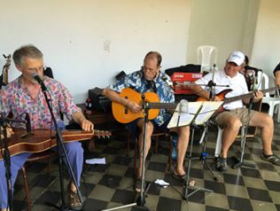

[Gran Pacifica resident Kent Payne and his garage band perform at the chili cook-off, pictured.]
When I graduated from Allegheny College in Pennsylvania with a political science degree, you either become a lawyer, and I didn’t want to do that, or you got into sales. So, I went into sales. Early on, I got influenced by some really, really good people who recommended sales literature. Several of them really stuck in my mind, specifically, Tom Hopkins, and the book “How to Master the Art of Selling.” Truly, in my mind, this is the absolute best sales book ever written.
Jet Metier: What did you learn from that book?
Jet Metier: What did you learn from that book?
Mike Cobb: Well, that book is more about what the process of sales really is. It’s a technical book. It’s not a “rah-rah” book. You know there are a lot of rah-rah books out there, like Tony Robbins, who teaches “You can do it with positive thinking.”
I believe in all that, but I think that in order to be successful, you need to have both a positive attitude and skills, and Tom Hopkins provided the skills side of that equation better than anyone I know, as did that book, better than any book that I have ever read. I was devoting tens of hours a week to internalizing the sales material and using it in my various sales jobs.
Jet Metier: What was your favorite sales job?
Jet Metier: What was your favorite sales job?
Mike Cobb: I think I had six jobs in about two years in retail. I worked at Radio Shack a few times and as a recruiter. I worked for a private computer company. So I had a bunch of jobs, all of which were in sales. And then about two years after graduation, I fell in with a Taiwanese couple, a husband and wife, and helped them build their computer business in the DC area as their VP of Sales for the next 12 to 13 years. We were a competitor of Dell and back then we did a lot of customization, which was before the big guys got into custom building computers. If you wanted Dell Model A, B, or C, you bought a Dell. If you wanted anything different, you had to go to a custom clone builder, which was what we were.
Jet Metier: You were really a hotshot.
Mike Cobb: I don’t know if I was a hotshot; I just worked my butt off. Earlier, you called me “The Hardest Working Man in Central America.”
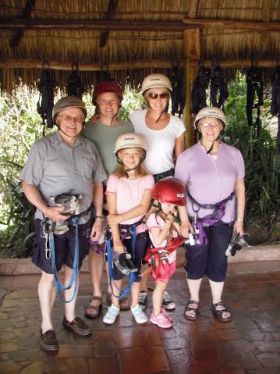
Jet Metier: Yes, I did.
Mike Cobb: I’m certainly one of them. I put in 70 plus hour weeks, pretty much right on through every week of the year.
Jet Metier: I believe it. I was going to ask for that number.
Mike Cobb: Sometimes on vacation, I only work 30 to 40 hours a week.
[Mike Cobb with his parents, wife and girls, after zipling through the jungles along Mombacho Volcano, pictured.]
Jet Metier: Tell me it isn’t so.
Mike Cobb: On vacation I still work four to five hours a day, but sometimes more. I love what I do. Ask me about what I do and I’ll tell you there’s an incredible significance in what I do because I started copying Tom Hopkins. And then I got derailed and started to learn from Zig Zigler by listened to a lot of his tapes and CDs.
Zig had a saying that I absolutely have lived by my entire sales career. And that is, “If you help enough people get what they want, you can have what you want.”
That underlies my belief in the entrepreneurial enterprise. Joel Nagel, a buddy of mine in college, and I purchased a couple of condos in Ambergris Caye back in the winter of ‘94 or ‘95. The developer was having lots of trouble finishing the buildings next to ours. Three buildings were under construction beside ours and over the course of much of that year, they just weren’t getting built. And so we were talking to the developer one day and we asked him why he wasn’t finishing his buildings.
His answer was that there was no finance money and most North American customers expect financing when they come to Belize. They come down and say, “How much is a condo?”
And he would say, “A hundred and fifty grand.”
And they would say, “Great. Let me give you $30,000. You finance $120,000.”
Well, there was no financing available back then. The banks in Belize would not finance a North American and a bank in the United States would not finance a condo in Belize. And so there was this big hole in the marketplace, which goes back to the Zig Ziglar thing. Lots of people walking around in Belize want to buy a condos, you had people like the developer who wanted to sell the condos, but you didn’t have this missing piece of financing, so we put together a mortgage company. Seven years later, this company became Caye Bank. It was started as a mortgage company to serve a need that wasn’t being met by anyone else there..jpg)
.jpg)
[Caye Bank building, pictured.]
Jet Metier: That was the missing piece of the puzzle. Before working for the computer company and landing in Central America, what was the pivotal point, where you said, “I’m going to build abroad.” What did you do? What kind of skills did you develop before you actually landed in Nicaragua?
Mike Cobb: The computer industry was changing, so I knew I had to re-tool, either on the computer side of things towards telephony or something related to it or I was going to have to re-tool into something different. I really wasn’t that interested in the telephony side of the computer business, so I didn’t go into that. On hindsight, if I would have, I would probably be a “bazillionaire” by now. But I’m glad I made the decisions I made.
The mortgage company was interesting. Because we were working a lot with developers, we started to see that a lot of the properties that they were selling were not good at all and they did not meet North American standards. I knew I had to re-tool and quite honestly re-tooling into a business in Central America was far more exciting. We identified the very strong need that was not being met by the marketplace, both on the finance side and also the building a quality product, so I decided to leave the computer business.
Jet Metier: Mike, there is nothing in your background in construction or real estate sales. There’s nothing in your background that shows anything about urban or community planning. There’s nothing in your background that looks at the needs of people in retirement. This is out of whole cloth, all completely new, completely different than what you were doing before you came to Nicaragua.
Mike Cobb: There’s a saying, and I think it’s true, that it takes 10,000 hours to be a master at something.
Jet Metier: Oh yes, yes, yes. I read the book, Outliers.
Mike Cobb: To get your 10,000 hours, if you work forty hours a week, it takes 5 years. If you work 80 hours a week, it takes two and a half years. So I just made the commitment that I was going to do whatever it took to be a master at this new business in as short period of time as possible.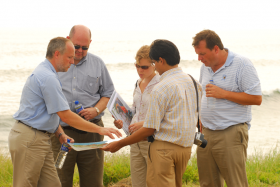

Jet Metier: So what are the “master hats” that you wear?
[Cobb and co-founder Joel Nagel with Forbes reporter for an article in the Forbes Retirement Guide 2008, pictured.]
Mike Cobb: The sales mastery continues no matter what you’re doing. In 1998, we bought a small resort in Belize, The Exotic Caye Beach Resort, which was in foreclosure. My wife and I moved there in September of 1998 and turned it around. We got new management, fixed it up and set up the marketing. And then we moved back to the United States after we sort of accomplished the mission. I think my first mastery was resort operations, although I don’t know if I ever got quite 10,000 hours on that, but I’m probably halfway there. I would say that the mastery I have now is that of a developer in Central America. It’s different than being a developer in the United States.
Jet Metier: What are the impacts of Gran Pacifica, your residential development, on the Pacific coast of Nicaragua? Have local businesses filled in to provide goods and services for expats who dream of life in a Nicaraguan beach community?
Mike Cobb: We’re probably still three to five years away from having true economic critical mass. We probably have 30 to 40 people year round, and maybe another 30 in the high season, which is during the North American winter. And that’s still not quite enough. Having 35 people year round isn’t really enough to support a business. We have a restaurant, and we have a bar. When that number doubles over the next three to five years or maybe even more than doubles, when you’ve got 80 to a 100 people year round and you have 250, 300 in the high season, then you can have other businesses. I think we’re on the cusp of it..PNG)
Mike Cobb: We’re probably still three to five years away from having true economic critical mass. We probably have 30 to 40 people year round, and maybe another 30 in the high season, which is during the North American winter. And that’s still not quite enough. Having 35 people year round isn’t really enough to support a business. We have a restaurant, and we have a bar. When that number doubles over the next three to five years or maybe even more than doubles, when you’ve got 80 to a 100 people year round and you have 250, 300 in the high season, then you can have other businesses. I think we’re on the cusp of it.
.PNG)
[Arial view of Gran Pacifica, pictured.]
But if somebody came to me today and said, “Hey, I’m going to open up a hair salon.”
I’d say, “No. Don’t. It’s not going to work.”
We are working really hard on getting more people to move here. We’re still building a lot of homes. I think we have 14 or 15 homes under construction right now. We’ve got 42 condos under construction. You can’t have people, unless you have addresses, homes, condos and villas for them to stay in or live in. So the key to get economic sustainability is getting more homes, more condos, and more villas built. You either have full time residents, as either owned or occupied, or renters who come, and they can be long term renters or short term renters. But you have to have physical addresses for people to sleep in, so we’re on a big push to triple the number of addresses over the next three to five years.
Jet Metier: Speaking of addresses, unlike Panama, are you going to have street names and houses that have numbers? You know what I’m talking about, don’t you, Mike? How do people find other people’s houses?
Mike Cobb: Everybody knows everybody. It’s just a few people right now. But at some point, as we get more people, we will have to name the streets; we will have to put up house numbers.
Jet Metier: It’s like Mayberry RFD. Everybody knows everybody.
Mike Cobb: It is. It really is like Mayberry RFD right now.
Jet Metier: Speaking of addresses, unlike Panama, are you going to have street names and houses that have numbers? You know what I’m talking about, don’t you, Mike? How do people find other people’s houses?
Mike Cobb: Everybody knows everybody. It’s just a few people right now. But at some point, as we get more people, we will have to name the streets; we will have to put up house numbers.
Jet Metier: It’s like Mayberry RFD. Everybody knows everybody.
Mike Cobb: It is. It really is like Mayberry RFD right now.
[Mike Cobb with friend Josefina Pastora at a Gran Pacifica party, pictured.]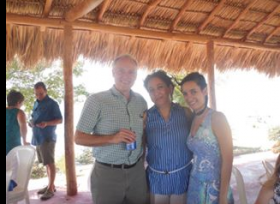

Jet Metier: When I first heard about your development, Mike, I could tell there was a wish list going on. What kind of feeling or vibe or way of living did you imbue into ECI’s development in Gran Pacifica?
Mike Cobb: That’s a wild, great question, Jet. For me, and this just goes to my general philosophy, it’s always about serving somebody with what they want at their deepest, most significant, “heart level.”
There’s an old saying that we all have a hole in our soul, and I think God, for me and many people, fills that hole in their soul. But other things can help fill the hole, too. Meaningful relationships with other people can help fill that hole.
When I go buy the iPhone 3, and then six months later, I buy the iPhone 4, and the 5, and the 6, and then the 6000, I fill the hole for a minute or two in the store, but it’s like eating a sugar cube. Yeah, it gives you energy for four minutes, and then you have to eat another one, as opposed to eating a steak, which sits on your stomach for an hour or two or more. The steak feeds you.
So to me, the real essence of my mission in life is to help people really find this meaning and significance in their lives through interaction with others, via community. And so, we built Gran Pacifica, we built Grand Bayman, and other communities are on the drawing board.
For me, it’s about building real community, so when we started to think about what we wanted to do with our property and who we were going to market it to, which is primarily North Americans, we went out and hired a company called Urban Design Associates, because they understand both the science and the art of designing community by designing the physical infrastructure to fulfill it. That’s why I say that building a community is an art and a science.
A lot of people living in the suburban US do not know their neighbors. They might know the people on either side, but if you said, “Who is your neighbor three doors down?” They wouldn’t know.
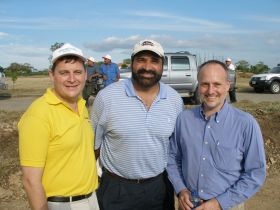
[Pittsburg Steeler Franco Harris as part of the humanitarian work to build a library, participated in an ECI shareholder meeting held at at Gran Pacifica, pictured.]
Jet Metier: It’s very sad. We seem to have lost the sense of community we used to have back when I was growing up.
Mike Cobb: Exactly. Let me tell you a story. A man by the name Andres Duany had a piece of property that was left to him in the Panhandle of Florida. He and a bunch of other guys got together in the 70s and said, “This suburban stuff is no good,” so they built a place called Seaside. It was only one place and it was built as an experiment.
Jet Metier: It’s very sad. We seem to have lost the sense of community we used to have back when I was growing up.
Mike Cobb: Exactly. Let me tell you a story. A man by the name Andres Duany had a piece of property that was left to him in the Panhandle of Florida. He and a bunch of other guys got together in the 70s and said, “This suburban stuff is no good,” so they built a place called Seaside. It was only one place and it was built as an experiment.
They said, “We’re going to put sidewalks on both sides of the street. We’re going to make small lots and put the houses close together.”
Nobody really thought it would work. In the first year or two, people thought it was horrible idea, and said, “You’re out of your mind.”
Well, it did work. Once the houses started to fill in, people began having fun.
[Daughter Amanda learning to surf, pictured.]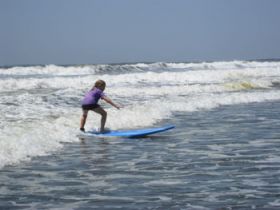

And here’s how it works, Jet. According to the architectural covenants and restrictions, every home has to have a front porch, and the front porch must be between 10 and 20 feet from the sidewalk.
So here’s what happens when new people move in. People sit out on their front porch, because that’s where they’re going to hang out when they’re outside. You come walking down the sidewalk, going to the pool or the tennis courts or wherever you’re going, and you’re just 15 feet away. The people are on the porch are going to say “Hi” to you on the sidewalk and you are going to say “Hi” back.
Then the next time you’re coming back from the beach or it’s the second day, and they see you again, they may ask, “Hey, how are you guys? Where are you all from?”
And you might answer, “I’m from Atlanta.”
And they respond back, “I have relatives in Atlanta. I have an aunt who lives in Atlanta. What part of Atlanta?” Now, you got a conversation going.
Jet Metier: So the sidewalks are not just for people to be safe from traffic. You want a sidewalk which encourages walking in front of people’s homes where the homes have an open and inviting porch that is kind of like an interface with a life of the street; the life in the community..jpg)
Mike Cobb: That’s right.
Jet Metier: Lovely.
Jet Metier: So the sidewalks are not just for people to be safe from traffic. You want a sidewalk which encourages walking in front of people’s homes where the homes have an open and inviting porch that is kind of like an interface with a life of the street; the life in the community.
.jpg)
Mike Cobb: That’s right.
Jet Metier: Lovely.
[Cobb family on top of a mountain outside Matagalpa Nicaragua, circa 2004, pictured.]
Mike Cobb: And the other thing, which is kind of the science of it, is that if it’s more than a five-minute leisurely stroll, people will get into their car and drive. If it’s less than five minutes, and they have a sidewalk, they’ll walk.
So that’s the key. If it’s more than a five-minute walk, most people will drive to the tennis court. But if it’s less than five minutes, they will walk, if there’s a sidewalk. Also, in a hot climate, the sidewalk has to be shaded, so one of the things that we did immediately upon the completion of the sidewalk was to plant fast-growing trees.
Jet Metier: So, were these fast growing-trees interlaced over the middle of the street or are their branches just enough to cover the sidewalk and part of the yard?
Mike Cobb: Jet, they already interlaced over the streets.
Jet Metier: So, were these fast growing-trees interlaced over the middle of the street or are their branches just enough to cover the sidewalk and part of the yard?
Mike Cobb: Jet, they already interlaced over the streets.
[Lovely home and walkway in Gran Pacifica, pictured.].jpg)
Jet Metier: Oh, beautiful, Mike. That sounds wonderful.
Mike Cobb: It is. It really is. In Gran Pacifica, people walk around.
.jpg)
Jet Metier: Oh, beautiful, Mike. That sounds wonderful.
Mike Cobb: It is. It really is. In Gran Pacifica, people walk around.
Jet Metier: When you talk to people about why they bought at Gran Pacifica rather than other subdivisions, what do they usually say?
Mike Cobb: Let’s be clear what the people saw who bought early on in Gran Pacifica; there were just sunbaked, hot sidewalks with trees that were only about three feet tall.
Jet Metier: But they shared your vision.
Mike Cobb: And that’s what they bought.
Jet Metier: And you followed through.
Mike Cobb: There was no community, per se. The first house was our house alone. We built one model home, but we had a lot of people kind of teed up, and so we actually had the model home under construction while we were building some custom homes for people. At the beginning we had six or eight going up at the same time. Then one home was finished and somebody moved in, and we had our first resident.
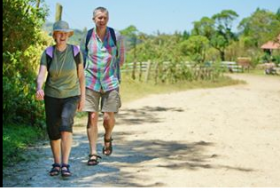
Today, people come. They like the environment, they like the neighborhood, they like the neighbors that they will have. Not everybody likes everybody, but generally, they find people that they like being around and it are becoming a community.
[Residents of Gran Pacifica taking a stroll along a country road, pictured.]
Jet Metier: So tell me a story about somebody who came there on a vacation and during their vacation, they put down a down payment? Do you have a story like that and the circumstances in which they bought?
Mike Cobb: This guy didn’t come, quote, as a tourist per se, but came down and wanted a place to create a home in Nicaragua. He was an early buyer. He knew it wasn’t a community yet, but he could see it becoming a community, and he wanted neighbors and friends. He also wanted the phenomenal surf break because he is a surfer; he’s from Southern California. He built a beautiful, incredible custom house. His architect was Charles Wallace.
After he built his house he had this huge paella party with this huge five-foot diameter pan in his backyard. He invited everyone over for the celebration. And it was tearful. I mean, he was tearful about how we had helped him achieve this great life.
Jet Metier: So he was emotional and he wanted to thank ECI for his new home in Gran Pacifica. Was he a single man? Did he feel that he had a new extended family?
Jet Metier: So he was emotional and he wanted to thank ECI for his new home in Gran Pacifica. Was he a single man? Did he feel that he had a new extended family?
Mike Cobb: He is single; no family in Nicaragua. He has created this extended family.
.JPG)
Jet Metier: Wonderful story, Mike, and it really sums up why you do what you do, and work so hard at it. My best to your wife and family.
[Outing to the famous mountain top, Selva Negra in Nicaragua. Seated front to back and right to left in the "estrogen mobile" with Mike are wife Carol, friend Cristina, daughter Amanda, intern Rachel and youngest daughter Emily in far back, pictured.]


